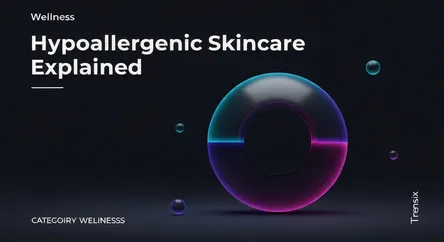Wellness
Hypoallergenic Skincare Explained

Discover what hypoallergenic skincare means, why it's gaining popularity, and how it helps minimize allergic reactions for all skin types.
What is it?
Hypoallergenic skincare refers to products formulated to minimize the risk of causing an allergic reaction. The term "hypoallergenic" literally means "below normal" or "slightly" allergenic, indicating that these products are less likely to cause a reaction compared to others. While it doesn't guarantee a product is completely allergen-free, it means manufacturers have intentionally avoided common irritants and allergens. These often include artificial fragrances, dyes, parabens, and harsh preservatives known to provoke skin sensitivities. The goal is to create a gentler product that works effectively without compromising the skin's health.
Why is it trending?
The rise in hypoallergenic skincare is closely linked to the broader "clean beauty" movement and growing consumer awareness about product ingredients. An increasing number of people identify as having sensitive skin and are proactively seeking out gentler formulations to avoid potential irritation. This trend is driven by a desire for minimalist routines and products that support the skin's natural barrier rather than stripping it with harsh chemicals. As consumers become more educated about potential irritants, the demand for transparent and milder skincare options continues to grow.
How does it affect people?
Using hypoallergenic products can significantly benefit individuals with sensitive skin, eczema, rosacea, or those prone to allergies, by reducing the likelihood of redness, itching, or inflammation. By avoiding known allergens, these products help keep skin calm and prevent flare-ups. However, their appeal is not limited to those with existing conditions. Anyone can use hypoallergenic skincare to minimize exposure to potentially harsh chemicals, which can prevent the development of new sensitivities over time and maintain a healthier skin barrier.